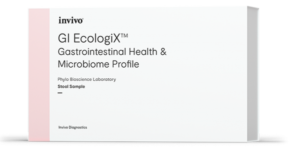
We have been running comprehensive stool testing for many years now and the advances in technology just keep getting better and better. Invivo’s GI EcologiX is the latest example.
Forensic squad
One of the advances is the technique used to examine the microbes. It looks for the presence of DNA rather than relying on their growth under laboratory conditions. Gut microbes live in a very different environment to that which is replicated in the lab. Many of the bacteria simply will not grow in the presence of oxygen for example. This test acts more like a forensic detective. Small traces of DNA can be identified, amplified and accurately quantified.
Calprotectin – a marker of inflammation
However, understanding whether you have active inflammation or whether your body is able to fight off any bacterial overgrowth or infection is also critical. Calprotectin is a protein biomarker that is present in the faeces when intestinal inflammation occurs.
Although an elevated calprotectin level indicates inflammation in the bowel, it cannot identify the cause. The level of calprotectin can be used to distinguish between ‘functional’ disorders such as IBS and the much more serious issue of inflammatory bowel disease such as Crohn’s disease and ulcerative colitis. It is not disease specific and may be associated with conditions other than IBD. Infections or use of aspirin or NSAIDs may also contribute to elevated levels. If your fecal calprotectin is over a certain level you will be referred for further investigation.
In clients who have already been diagnosed and are managing IBD, calprotectin can have value as a biomarker reflecting mucosal healing or potential flare.
The patient below has low grade inflammation, suggestive of IBS or a microbial imbalance rather than IBD. We will always retest this marker after three months on a support protocol however to make sure it is coming down.
We would recommend the client ceases (or dramatically reduces) alcohol intake and support them with an anti-inflammatory diet. Supplements such as curcumin, omega 3 and high dose probiotics may be considered but always in light of the client’s clinical picture. There is no such thing as one size fits all!
If you would like nutritional support, or advice about testing, call us on 01 2655977 or book online now


